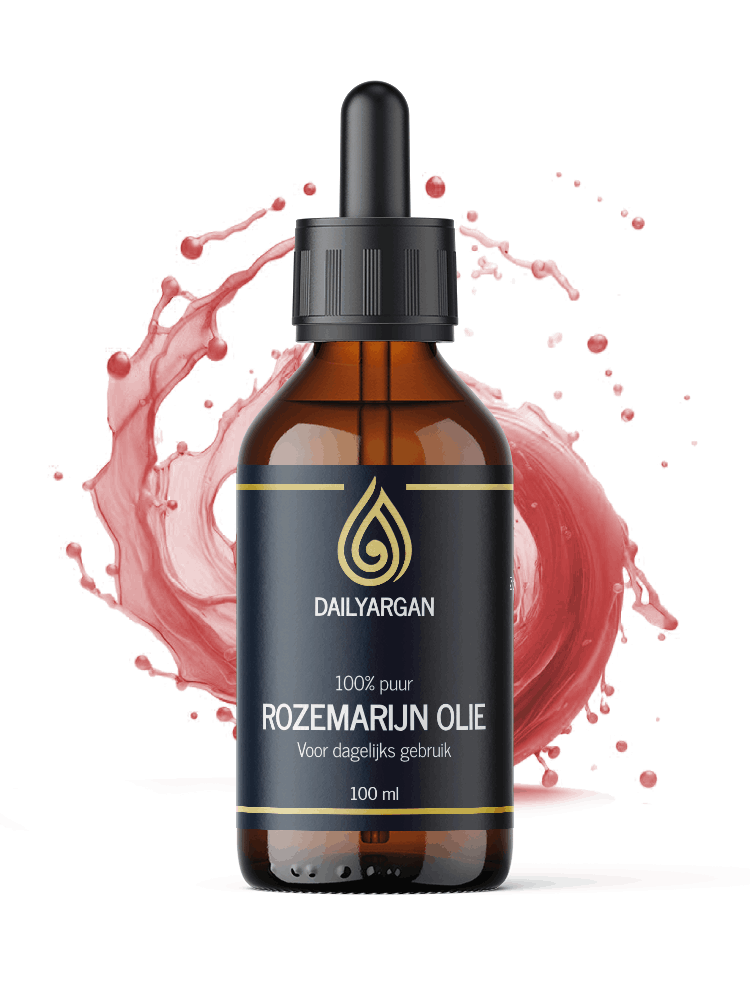Rosemary Oil
Rosemary Oil
Order before 16:00, shipped today
Couldn't load pickup availability
 Imported from Honduras
Imported from Honduras
 Animal Cruelty Free
Animal Cruelty Free
 100% Organic
100% Organic
Application of Rosemary Oil
Attention: for external use only. Do not use undiluted. Familiarize yourself with the use of Rosemary oil. Apply a small amount of oil to your skin to test for allergic reactions.
In Your Diffuser
Rosemary, with its spicy fresh scent, is ideal for the aroma diffuser. It stimulates concentration and mental functions, making it perfect for use in the morning. Effortlessly combine it with other stimulating oils such as basil, bay laurel, myrtle, peppermint, thyme, and pine oils, as well as with citrus oils, cedar, lemongrass, or petitgrain. Rosemary, through evaporation, can be used preventively for respiratory infections. The stimulating and expectorant properties are noticeable during inhalations, making it suitable for congested airways, bronchitis, and sinusitis. For an effective combination, add rosemary to cineole-containing oils such as eucalyptus, bay laurel, myrtle, or cajeput. Regular evaporation of rosemary is beneficial for people with weak respiratory systems, and the oil strengthens the body's defenses. In times of exhaustion, rosemary offers renewed strength and improves concentration, making it ideal for study and office times. Also, in cases of chronic fatigue, listlessness, dizziness, or melancholy, rosemary has a refreshing effect.
On the Skin
Rosemary oil, according to general application rules, stimulates circulation and warms the skin. Particularly poorly circulated skin, oily skin, oily hair, edematous tissue, and cold hands and feet benefit from rosemary. It combats acne, skin abscesses, and other skin inflammations. Due to its antispasmodic and pain-relieving properties, it is effective against muscle pains, muscle cramps, and rheumatic pains, especially when combined with spike lavender and/or frankincense. The verbena type is specifically cardiotonic and can be applied to the sternum in cases of cardiac weakness and tachycardia. Rosemary is also suitable for people with low blood pressure.
Potential Effects of Rosemary Oil on Hair Growth
In recent times, claims have circulated about the stimulating properties of rosemary oil on hair growth. Some even claim that it can work preventively against hair loss. Countries around the Mediterranean seem to incorporate rosemary more frequently into hair care products than in our region.
The increasing popularity of rosemary oil is likely attributed to commonly known characteristics of the oil:
- Anti-inflammatory properties
- Improvement of blood circulation
It is assumed that improved blood circulation can protect hair follicles from dying off due to a lack of blood, which in turn would prevent hair loss. Hair follicles are responsible for the production and anchoring of hairs in the skin. Additionally, it is claimed that rosemary can also reduce dandruff and scalp itchiness.
Can these claims be confirmed by scientific research?
Research indicates that rosemary oil may be promising for hair growth. In a 2015 study, rosemary oil was compared to minoxidil 2% in the context of hair loss. Minoxidil is currently the only recognized remedy for hair loss, better known under the name Rogaine.
In the Bath
According to general application rules, rosemary can be used in the bath for respiratory complaints, slow excretion of waste products, fungal infections, low blood pressure, and pains. A bath with rosemary provides relief from fatigue and has an invigorating effect.
```


